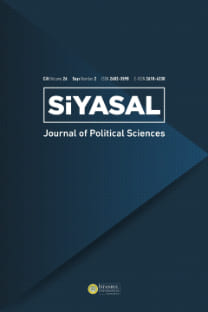Türk siyasi partilerinde lider oligarşisi: Evrimi, kurumsallaşması ve sonuçları
Türk siyasi partilerinin liderlik yapısı oligarşiktir, lider yenilemekte zorluklarla karşılaşmaktadırlar. Lider oligarşisinin şekillenmesinde tek parti mirası, merkezi devlet yapısı gibi devlet önderliğinde modernleşme sürecinin yanında siyasette himaye ilişkilerinin yaygınlığı, lider egemenliğini destekleyen kültür ve benzer unsurlar yer almaktadır. Oligarşik liderlik devam eden himaye ilişkileri aracılığıyla gücünü korumuş, kendisini destekleyecek bir hukuk yapısı da oluşturmayı başarmıştır. Partilerin örgüt yapısı, aday belirleme yöntemleri ve çok sayıda diğer faktör lider oligarşisini desteklemektedir. Yapı, demokrasinin işleyişini zorlaştırmaktadır.
The evolution, the ınstitutionalization and the consequences of leadership oligarchy in Turkish political parties
Turkish political parties display an oligarchic leadership structure and experience difficulty in changing leaders. In addition to state directed modernization producing a legacy of single party rule which Turkish democracy has inherited and the powerful central state as a model, the prevalence of clientelistic relations and the evolution of a culture supportive of leadership oligarchy have all contributed to leadership oligarchy. The oligarchic tendencies continue to be supported by the con- tinuation of extensive clientelistic relations and the construction of a legal framework that supports it. The organizational structure of parties, their methods of candidate designation for public office and many other factors lend support to the continuation of leadership oligarchy. Oligarchic leadership structure is dysfunctional for the well-functioning of a democratic system.
___
- • Acar, Feride (1991), “The True Path Party,” Metin Heper ve Jacob Landau, derl., Political Parties and Democracy in Turkey. Londra: I. B. Tauris.
- • Atatürk, Kemal (1951), Nutuk, cilt. 1. İstanbul: Milli Eğitim Basımevi.
- • Bektaş, Arsev (1993) Demokratikleşme Sürecinde Liderler Oligarşisi: CHP ve AP (1961-1980). İstanbul: Bağlam.
- • Erdem, Tarhan ve Nejat Uyguner (1994), CHP Üye Kayıtlarını Merkezde Toplama Projesi, 1978. İstanbul.
- • Gillespie, Richard (1994), “The Resurgence of Factionalism in the Spanish Socialist Workers’ Party,” David S. Bell ve Eric Shaw, derl., Conflict and Cohesion in Western Social Democratic Parties. Londra: Pinter.
- • Güneş-Ayata, Ayşe (tarihsiz) Kasaba’da Politika ve Politikacı (basılmamış tebliğ)
- • Güneş-Ayata, Ayşe (1994) “Roots and Trends in Clientelism in Turkey,” Luis Roniger ve Ayşe Güneş-Ayata, derl., Democracy, Clientelism and Civil Society. Boulder,Lynne Rienner.
- • Koçak, Cemil (1986). Türkiye’de Milli Şef Dönemi, 1938-1945. İstanbul, Yurt Yayınları.
- • Michels, Robert (1962) Political Parties. New York, Free Press.
- • Nadi, Yunus (1964) Perde Aralığından. İstanbul, Cumhuriyet Yayınları.
- • Özbudun, Ergun (1987) “Turkey,” Myron Weiner ve Ergun Özbudun, derl., Competitive Elections in Developing Societies. Durham, Duke University Press.
- • Özbudun, Ergun (1968) Batı Demokrasilerinde ve Türkiye’de Parti Disiplini. Ankara: Ankara Üniversitesi, Hukuk Fakültesi
- •Roniger, Luis (1994) “The Comparative Study of Clietelism and the Changing Nature of Civil Society in the Contemporary World,” Luis Roniger ve Ayşe Güneş-Ayata, derl., Democracy, Clientelism and Civil Society. Boulder: Lynne Rienner.
- • Rustow, Dankwart A. (1973) “The Modernization of Turkey in Historical and Com parative Perspective.” Kemal Karpat, derl., Social Change and Politics in Turkey.Leiden: E. J. Brill.
- • Sayar, Sabri (1976) “Aspects of Party Organization in Turkey,” Middle East Journal,Spring.
- • Sayar, Sabri (1975) “Some Notes on the Beginning of Mass Political Participation in Turkey,” Engin D. Akarlı ve Gabriel Ben-dor, derl., Political Participation in Turkey: Historical Background and Present Problems. Istanbul: Boğaziçi University.
- • Steinbach, Udo (1984) “Atatürk’s Impact on Turkey’s Political Culture Since World War II,” Jacob Landau, derl., Atatürk and the Modernization of Turkey. Boulder: Westview.
- • Stockwin, J. A. (1992) “The Japan Socialist Party” Resurgence after a Long Decline,” Ronald J. Hrenebar, derl., The Japanese Party System. Boulder: Westview.
- • Sunar, İlkay (1990), “Populism and Patronage: The Democrat Party and Its Legacy in Turkey,” Il Politico (Pavia, Italy), 55:4.
- • Tachau, Frank (1991) :The Republican People’s Party, 1945-1980,” Metin Heper ve Jacob Landau, derl., Political Parties and Political Democracy in Turkey. London: I.B. Tauris.
- • Turan, İlter (1994), “Leadership Change in Turkey,” Mediterranean Politics, Cilt 1. London: Pinter.
- • Turan, İlter (1971), “Parti Disiplini: Kapsam, Tarihçe, Teşvik Eden Sebepler,” İstanbul Üniversitesi İktisat Fakültesi Mecmuası, 28:1-4.
- • Turan, İlter (1969) Cumhuriyet Tarihimiz. İstanbul: Çağlayan.
- • Zeigler, Harmon (1993) Political Parties in Industrial Democracies. Itasca, İllinois:F.E. Peacock.
- ISSN: 1303-1260
- Yayın Aralığı: Yılda 2 Sayı
- Yayıncı: İstanbul Üniversitesi
